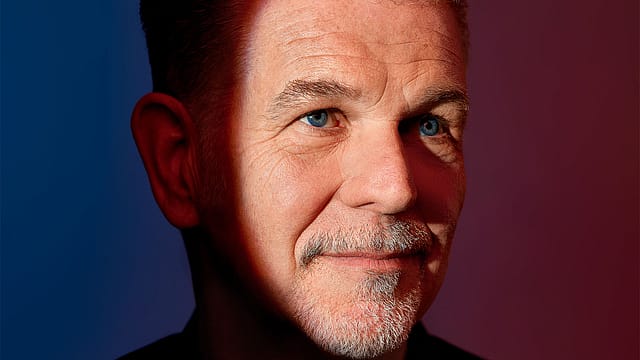‘The most remarkable change has been Reliance Jio’

Reed Hastings, 60, founder and co-CEO of the $25-billion-plus streaming giant Netflix, says the dramatic fall in data prices in India, brought about by the Mukesh Ambani-owned Reliance Jio, has played a big part in the success of streaming services like his in India. He says nowhere in the world have data costs gone from one of the highest to one of the lowest in a span of just four years as they have in India. In fact, without the transformation brought about by Reliance Jio, Netflix’s business wouldn’t have worked in India, Hastings says in hindsight. “We were fortunate that just as we started investing in content, other people were investing in transforming the Internet,” says Hastings, during an exclusive interview with Fortune India, from a ski lodge in the Utah mountains. Netflix has just completed five years in India.
Hastings, who says he has been binge-watching Netflix original Bridgerton while a storm raged outside, also talks about the Netflix ‘no rules’ management mantra, competition, and the India strategy over a Zoom call. Edited excerpts:
To what do you attribute the culture of innovation at Netflix?
I had an unusual experience in my first company [Pure Software] from 1990 to 1997. I’m an engineer by background and we optimised everything as an engineering problem. What happened over time is we were extremely efficient, because we had all these rules. But we were very inflexible because we just had a lot of rules. And then the market changed… and we were so rigid that we were unable to adapt and we ended up having to sell the company. And so, my big lesson was the danger of over-optimising for efficiency, with rules and processes. And that it strangely was better to manage on the edge of chaos; where some crazy stuff happens, but also, it’s very fertile. And an organisation is more like an ecosystem with lots of moving parts, than it is like a factory. Now I try to have a healthy ecosystem, but [try] not to over-manage it.
Does managing on the edge of chaos help creativity and innovation?
That’s allowed us to make many changes from [being a] domestic DVD company, to streaming all titles, to developing our own, to expanding around the world, to becoming a big studio, [and] many hard expansions. We’ve got people who have to think on their feet, because there are no rules. And the people who think on their feet can adapt more easily. And so, we’ve been able to be very flexible and adapt.
Again, because you attract the people who like trying things. And you know, there are no rules. So people just try things. And you do have to be careful, because you are managing on the edge of chaos, you don’t want to actually fall into chaos.
How do you assess the last five years in India? What is the plan for the future?
The most remarkable change anywhere in the world has been Reliance Jio. There’s no country that has gone from [having] some of the world’s most expensive data to the world’s most inexpensive data in four years. The transformation of the Indian Internet is phenomenal. In hindsight, our business probably could not have worked five years ago. We were fortunate that just as we started investing in content, other people were investing in transforming the Internet. In no other country in the world have the data costs gone like this [from high to low], and the usage quite like this [from low to high]. We’ve been growing every year, we’ve been just building our team, developing content, figuring out what works, whether that’s Sacred Games, or AK vs AK, just lots of different types of content. We’re still in the learning phase. It’s just the beginning of where we want to be in India.
What is your core management philosophy?
I got to live in Italy about 20 years ago. And what’s amazing about Rome is there are no international restaurants. And I’ve come to realise that [it’s just] a few things like pasta and tomatoes, just done so, so well… that it has become my life philosophy to keep it simple. Do a few things like what we do, and do them extremely well.